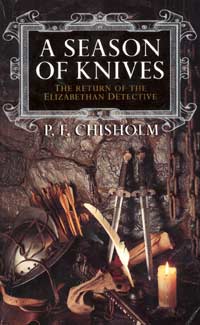A SEASON OF KNIVES
By P F Chisholm
(second in the Carey series)
Sir Robert Carey – the dashing Deputy Warden – is up to his elegant neck in trouble again.
Somebody has murdered the former paymaster to the garrison – the man Carey has just sacked. His servant Banrabus has been thrown in the castle dungeon. And his archenemy, Sir Richard Lowther, is doing his best to convict Carey of the crime.
With Barnabus under the threat of hanging and himself staring ruin in the face, Carey must fight prejudice, corruption and blackmail to get to the truth and save them both.

First page sample:
![]() Sunday 2nd July, 1592, evening.
Sunday 2nd July, 1592, evening.
![]() If he had been doing his duty as a husband and a father, Long George Little would not have been in Carlisle town at all that evening. All the other men of his troop were out on their family farms, frantically trying to get the hay made while the good weather lasted. Some of them were also taking delivery of very tall handsome-looking horses recently raided by their less respectable relatives from the King of Scotland’s stables.
If he had been doing his duty as a husband and a father, Long George Little would not have been in Carlisle town at all that evening. All the other men of his troop were out on their family farms, frantically trying to get the hay made while the good weather lasted. Some of them were also taking delivery of very tall handsome-looking horses recently raided by their less respectable relatives from the King of Scotland’s stables.
![]() Long George hated haymaking. It wasn’t his fault, he reflected gloomily, as he came out of the alehouse by the castle wall and ambled down through the orchards and into Castlegate street in the warm and shining dusk. There was something in hay which disagreed with him. It was fine while the grass was growing, and he could even mow with impunity, but put him in a hayfield among neat rows of drying grass, and within minutes he was wheezing and sneezing, his eyes had swollen, his nose was running and his chest felt tight. His wife refused to believe in these summer colds. It stood to reason, she would snap, that you got colds in the cold weather, not the hot. That was logic. It didn’t matter; whatever the logic of it, haymaking made him ill and if he started pitchforking the hay onto a wagon, he would also come up in a bright red rash that made his loife a misery for another week at least.
Long George hated haymaking. It wasn’t his fault, he reflected gloomily, as he came out of the alehouse by the castle wall and ambled down through the orchards and into Castlegate street in the warm and shining dusk. There was something in hay which disagreed with him. It was fine while the grass was growing, and he could even mow with impunity, but put him in a hayfield among neat rows of drying grass, and within minutes he was wheezing and sneezing, his eyes had swollen, his nose was running and his chest felt tight. His wife refused to believe in these summer colds. It stood to reason, she would snap, that you got colds in the cold weather, not the hot. That was logic. It didn’t matter; whatever the logic of it, haymaking made him ill and if he started pitchforking the hay onto a wagon, he would also come up in a bright red rash that made his loife a misery for another week at least.
![]() On the other hand, his wife was going to make his life a misery as well because there were two fields to mow, and none of the children were old enough to do more than bind and stack. Without her man the whole weight of it fell on her alone since she had no brothers and Long George’s family were busy with their own fields.
On the other hand, his wife was going to make his life a misery as well because there were two fields to mow, and none of the children were old enough to do more than bind and stack. Without her man the whole weight of it fell on her alone since she had no brothers and Long George’s family were busy with their own fields.
